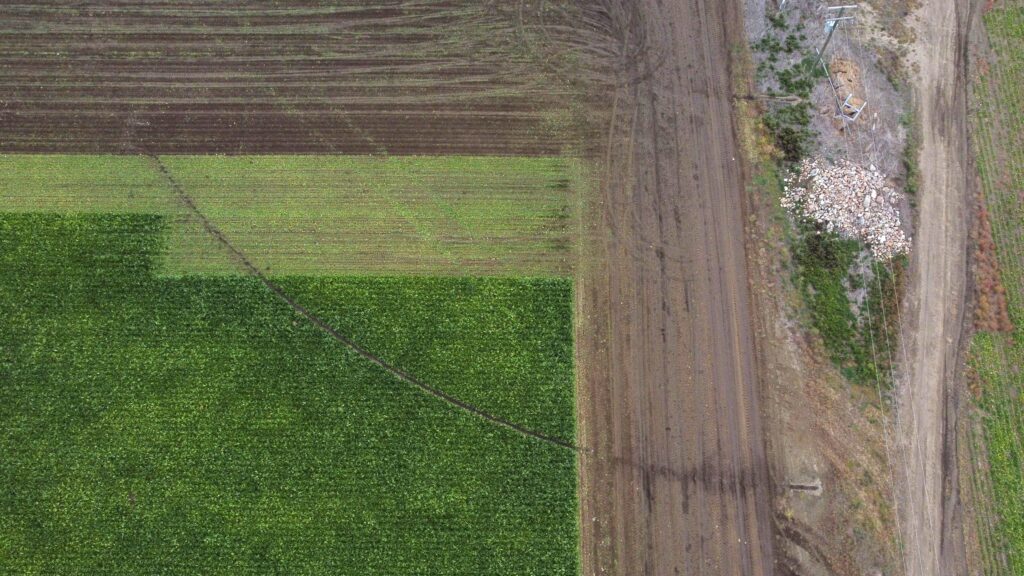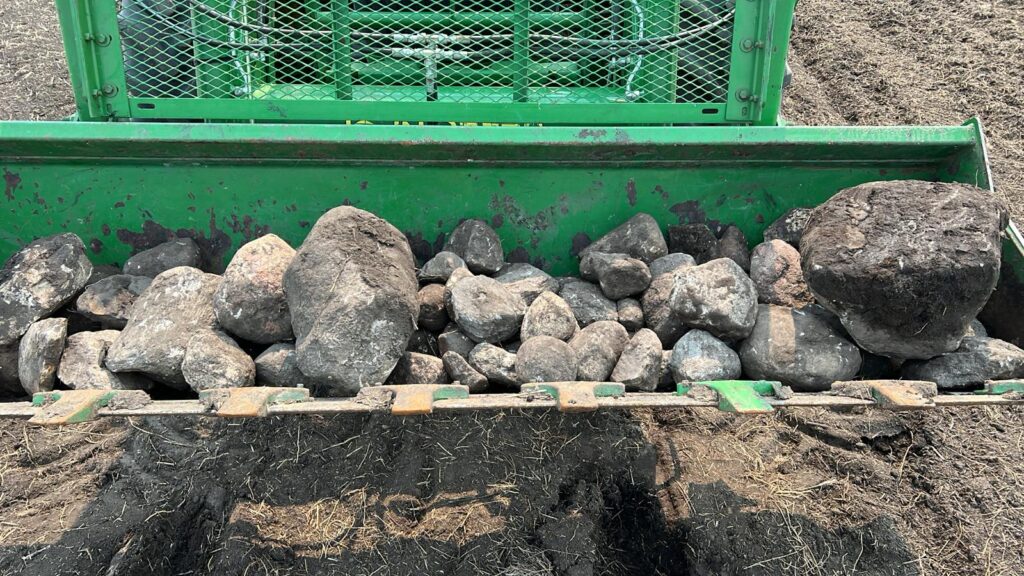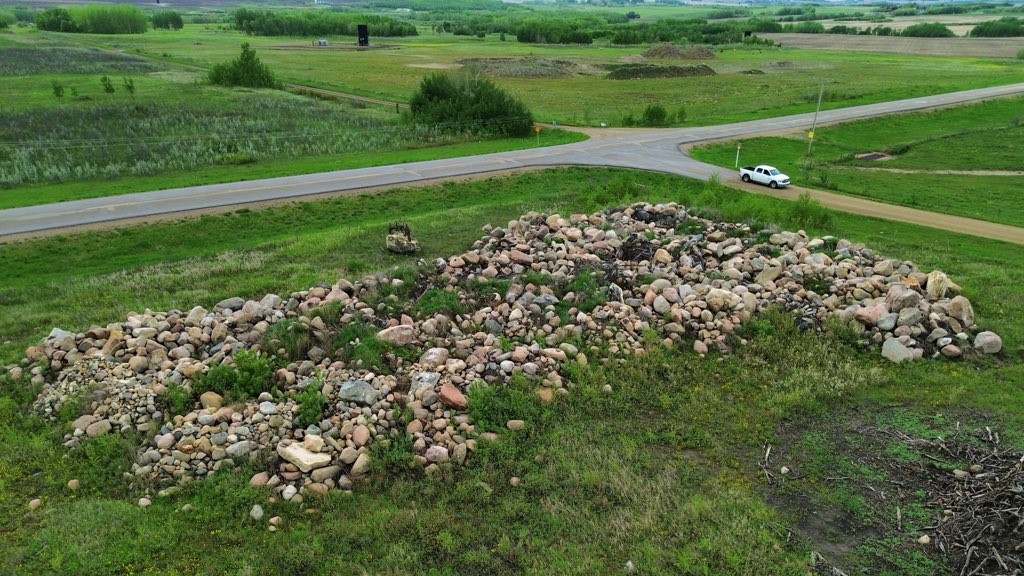Since the advent of mechanized seeding and harvesting, reemerging field rocks have forced farmers to solve the problem rocks pose through the use of the generational practice of rock picking.

Every year, farmers in rocky soil regions must clear their fields for the growing season. Rocks larger than 12cm threaten expensive equipment and must be removed. In Western Canada, rock picking averages $5.43/acre CAD annually, while missed rocks can cost between $7-24k CAD in repairs and downtime each year.
A Problem Created By A Solution
The invention of mechanized harvesting transformed agriculture, turning the American breadbasket into highly productive land. However, this innovation remains vulnerable to a simple threat: field rocks.
(Click to continue reading)
Often hidden beneath the soil, rocks can damage machinery designed to enhance farming efficiency.
Historically, rocks have always been a nuisance for farmers, manageable with ample labour. In New England, iconic stone walls are a testament to early settlers clearing rocks to protect crops and equipment. Here, enough rocks were removed from fields during the 1800’s to construct some 380,000 km of field wall – at the cost of more than 40 million days of human labour.
This problem persists in Western Canada. Rich, fertile soil is interspersed with rocks that emerge each spring, requiring rigorous rock picking. Frost heaves and soil erosion churn up rocks, threatening modern, high-cost farming equipment. Each rock larger than 12cm poses a risk, potentially causing costly damage and halting operations.
Rock picking, though labour-intensive and costly, is essential. On average, it costs $5.43 CAD per acre annually to clear fields. Despite these efforts, unpicked rocks causing rock strikes can cost between $7-24k CAD yearly in repairs and downtime. This ongoing struggle underscores the need for effective solutions, ensuring agricultural advancements aren’t undermined by the very ground they work on.
Labour Shortages
Historically, managing field rocks depended on abundant, low-cost labour. In the American Breadbasket, large families contributed collectively, ensuring efficient rock removal and protecting early mechanized equipment.
Today, Western Canada faces a different scenario. Larger fields and dwindling labour availability pose significant challenges. Children leave family farms, and migrant labour shifts further strain the workforce. Additionally, unprecedented weather changes add unpredictability, making rock management a logistical and financial burden amidst historic inflation levels.
Equipment Damage
Rocks in fields pose a serious threat to seeding and harvesting machinery. Rock strikes can cause extensive damage; for example, a strike can damage a combine header, leading to repair costs exceeding $10,000 CAD. Seed drills are also vulnerable, with repairs often costing between $5,000 and $15,000 CAD.
These direct repair costs are significant. Damage from rock strikes not only leads to expensive repairs but also shortens machinery lifespan, increasing overall operational costs.
Lost Time
The impact of rock picking extends beyond repair costs to significant time losses. When equipment is damaged by rocks, crucial planting windows for crops like wheat, canola, and barley are missed, reducing operational efficiency and affecting the bottom line.
In Western Canada, unpredictable weather shortens these windows, making any downtime a threat to the season’s yield. Modern farms have fewer labour resources, making timely planting and harvesting even more critical. Efficient rock picking ensures smooth operations, safeguarding agricultural productivity and profitability.
Impact of Drought
The risk of rock strikes escalates during drought conditions, like those recently gripping Southern Alberta. Farmers are bracing for a growing season with half the water of last year. In such dry conditions, crops don’t grow as tall, forcing farmers to cut lower with their combines, which increases the likelihood and severity of rock strikes.
With margins already razor-thin in drought years, the financial strain from equipment damage can be devastating. Efficient rock picking becomes even more critical, protecting machinery and ensuring that every possible advantage is leveraged to sustain operations in these challenging times.
Fire Risk
In drought-like conditions, the risk of fire due to rock strikes is significantly elevated. Recent incidents in the Grande Prairie region underscore this danger, where fires sparked by farm equipment hitting rocks have become a real threat. During extreme heat, even a small spark from a rock strike can ignite dry grass and crops, leading to devastating fires that spread quickly.
With farmers already facing challenges from drought, the added risk of fire can compound the financial and operational strain. Ensuring fields are clear of rocks not only protects equipment but also mitigates the fire hazard, safeguarding both crops and community. This is particularly important in Alberta, where fire risks are heightened during dry seasons.

The perennial challenge of rock picking in agriculture poses significant risks to equipment, time, and safety, especially under drought conditions. RockPro offers a practical solution, leveraging technology developed with farmers and for farmers, to maintain timely and efficient agricultural operations. Our services ensure rocks are detected and removed efficiently, protecting machinery and reducing downtime. By addressing this age-old problem with modern solutions, RockPro helps farmers sustain productivity and profitability, even in challenging conditions.
Join our mailing list to stay up to date:

